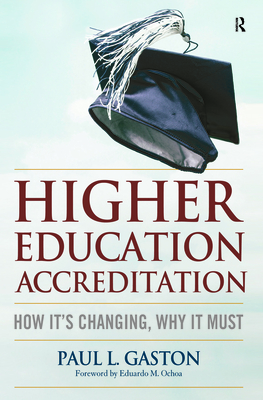Higher Education Accreditation: How It's Changing, Why It Must

Higher Education Accreditation: How It's Changing, Why It Must
Is the accreditation system "broken" as claimed by successive Secretaries of Education and some recent reports? This book addresses this question head-on, asking whether accreditation is indeed in need of radical reform, and whether the agencies' authority should be curtailed; or whether in fact the changes now underway - that accrediting agencies contend ensure rigorous and consistent standards and degrees that are a reliable gauge of student attainment - are moving the academy and the nation in the right direction. In a sweeping and ambitious book, Paul Gaston deploys his knowledge and experience as a peer reviewer for three regional accrediting agencies, a former board member and chair of the Association of Specialized and Professional Accreditors, and his involvement in the early stages of the Council for Higher Education Accreditation, to go beyond the polemics to explore whether a strategy that builds on the emerging values and good practices can achieve the substantive and positive improvements the public is demanding.As an introduction for readers new to the debate, he provides a brief overview of the development of accreditation, its terminology, and structure, describing how it currently works, and what it has achieved; and offers insight into the proliferation of the missions of accreditation - as well as the multiplicity of stakeholders with an interest in its outcomes - to question whether the mandate of accreditation should, as some contend, be expanded, or particular missions reassigned or abandoned. This established, he undertakes a dispassionate analysis of the arguments and recommendations of critics and supporters of the current direction of accreditation to identify common ground and explore constructive ways forward, paying specific attention to current and potential reforms of the three sectors of higher education accreditation: the seven regional accrediting associations, the national accreditors, and programmatic, or "specialized" accreditation. The book concludes by outlining a comprehensive approach to reform. His proposal would preserve practices that already work well while advancing important changes that can be incrementally implemented. The result would be a higher education accreditation structure more cost effective, more efficient, more transparent and accountable, and more responsive to institutional and public needs.
PRP: 489.09 Lei
Acesta este Pretul Recomandat de Producator. Pretul de vanzare al produsului este afisat mai jos.
440.18Lei
440.18Lei
489.09 LeiLivrare in 2-4 saptamani
Descrierea produsului
Is the accreditation system "broken" as claimed by successive Secretaries of Education and some recent reports? This book addresses this question head-on, asking whether accreditation is indeed in need of radical reform, and whether the agencies' authority should be curtailed; or whether in fact the changes now underway - that accrediting agencies contend ensure rigorous and consistent standards and degrees that are a reliable gauge of student attainment - are moving the academy and the nation in the right direction. In a sweeping and ambitious book, Paul Gaston deploys his knowledge and experience as a peer reviewer for three regional accrediting agencies, a former board member and chair of the Association of Specialized and Professional Accreditors, and his involvement in the early stages of the Council for Higher Education Accreditation, to go beyond the polemics to explore whether a strategy that builds on the emerging values and good practices can achieve the substantive and positive improvements the public is demanding.As an introduction for readers new to the debate, he provides a brief overview of the development of accreditation, its terminology, and structure, describing how it currently works, and what it has achieved; and offers insight into the proliferation of the missions of accreditation - as well as the multiplicity of stakeholders with an interest in its outcomes - to question whether the mandate of accreditation should, as some contend, be expanded, or particular missions reassigned or abandoned. This established, he undertakes a dispassionate analysis of the arguments and recommendations of critics and supporters of the current direction of accreditation to identify common ground and explore constructive ways forward, paying specific attention to current and potential reforms of the three sectors of higher education accreditation: the seven regional accrediting associations, the national accreditors, and programmatic, or "specialized" accreditation. The book concludes by outlining a comprehensive approach to reform. His proposal would preserve practices that already work well while advancing important changes that can be incrementally implemented. The result would be a higher education accreditation structure more cost effective, more efficient, more transparent and accountable, and more responsive to institutional and public needs.
Detaliile produsului








